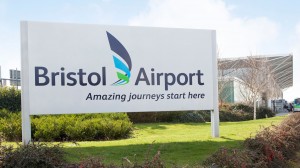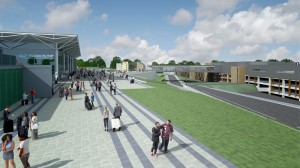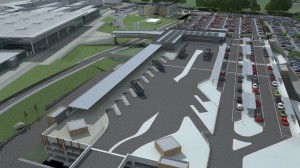Bristol Airport has hit the milestone of 10m passengers passing through its terminal in a 12-month period for the first time in its history.
The landmark means the airport is now running at capacity while its biggest capital project for more than two decades is underway. 
This includes a £60m development, due to open in summer 2025, which will significantly enlarge its public transport interchange, improve its internal road system and add an additional multi-storey car park as well as expanding its waiting rooms and rest facilities.
The scheme, which will help increase capacity to 12m passengers a year, is part of a £400m investment being made at the airport over the next five years by Canadian owner Ontario Teachers’ Pension Plan.
This will include new state-of-the-art security screening equipment, refurbishment of the air traffic control tower and improvements in the terminal building, including two new executive lounges – one of which will open this December – and 38 new or upgraded catering and retail outlets.
Bosses at the airport, which handled 9.8m passengers in 2023, say increasing capacity to 12m passengers will create thousands of jobs, open up new direct air links and support inbound tourism for the region. 
The airport also said the new public transport interchange underpinned its commitment to making it easier for passengers to use buses or coaches to get to or from the airport.
The hub, which will be on the top level of the multi-storey car park, will increase the number of bus/coach bays from six to 16, making it one of the region’s largest public road transport interchanges.
Bristol Airport currently has flights to more than 120 direct destinations across 31 countries, with its daily services to the hub airports in Frankfurt, Amsterdam, Dublin and Paris connecting to hundreds of destinations worldwide.
To celebrate reaching the 10m milestone, 10 passengers were selected at random in the terminal and presented with return airline tickets, retail and catering vouchers and other gifts. 
Bristol Airport CEO Dave Lees said: “It is exciting to mark these milestones with customers and colleagues as they demonstrate how much progress has been made on our transformation programme.
“Hopefully this gives our customers an appreciation of how soon they will be able to start making use of these new state-of-the-art facilities.
“Over £400m is being invested in the airport facilities, which will be transformational – not just in terms of the buildings being created, but the experience we will be able to deliver to customers, airlines and business partners.
“We continue to make a major contribution to skills and employment in the region, by recruiting local people for local jobs and providing apprenticeship opportunities across the 50 separate businesses we have based on site.”
The airport officially opened in 1957 as Bristol (Lulsgate) and handled 33,000 passengers in its first year. On its busiest day last year 40,000 people passed through the terminal over a 24-hour period.
Its current terminal building opened in 2000, a year in which passenger numbers passed the 2m mark for the first time.
The airport had been restricted to an annual limit of 10m passengers under its previous planning permission.
Its expansion plans were originally rejected by North Somerset Council nearly four years ago but overturned on appeal by the airport to the government’s Planning Inspectorate.
While the expansion was backed by regional business groups, it was opposed by neighbouring councils and the West of England Combined Authority (WECA), mainly on the grounds of higher emissions from increased air traffic.
Many of the region’s MPs were also opposed, with Bath MP Wera Hobhouse calling the Planning Inspectorate’s approval “a bleak day for our planet”.
A legal challenge by anti-expansion umbrella group Bristol Airport Action Network (BAAN), arguing that the expansion would not be legally compliant with the Climate Change Act, the Paris Agreement and the government’s commitment to be carbon neutral by 2050, was rejected by the Secretary of State for Levelling Up.
The airport has set an ambitious target of becoming net zero by 2030 – which, if successful, would make it the first UK airport to achieve the standard.
To achieve this it has introduced a range of measures including opening an on-site solar farm, using electric buses to transfer passengers to their planes and planting carbon-absorbing flowers and grass.



















